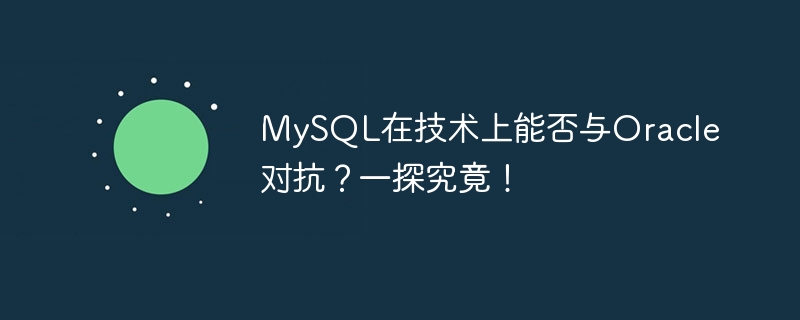

Can MySQL technically compete with Oracle? check it out!
With the advent of the digital age, enterprises have increasing demands for database systems to meet the storage of massive data, efficient data processing and reliable data protection. For database systems, MySQL and Oracle have always been the two most popular and powerful competitors on the market. So, can MySQL technically compete with Oracle? This article will conduct a comparative analysis of the technical characteristics of MySQL and Oracle to find out.
First of all, from a technical architecture perspective, MySQL and Oracle have some significant differences. MySQL uses a client/server model, that is, the client connects to the MySQL server through the network and operates the database through SQL statements. Oracle uses a multi-process and multi-thread architecture, which enables Oracle to have better performance than MySQL when handling concurrent requests and large-scale data operations.
Secondly, from the perspective of functional features, Oracle is more powerful and comprehensive than MySQL in terms of functions. Oracle provides many advanced features, such as partitioned tables, index-organized tables, materialized views, transparent distributed databases, etc. These features allow Oracle to run more efficiently while processing complex business logic and large amounts of data. Although MySQL also provides some functions, such as partition tables, index optimization, etc., it is still relatively simple compared to Oracle.
Again, from a performance perspective, there are some differences between MySQL and Oracle. MySQL performs better when processing a small amount of data and simple queries, but its performance is slightly inferior to Oracle when processing large-scale data and complex queries. Oracle, on the other hand, can better utilize its superior performance when processing complex queries and highly concurrent requests, which also benefits from Oracle's advanced optimizer and query optimization operations.
In addition, scalability is also a key feature between the two. MySQL is relatively strong in scalability and supports master-slave replication, distributed architecture and other methods to meet the needs of large-scale data processing. Oracle is more suitable for large-scale enterprise-level environments. Its scalability is very powerful and can cope with the challenges of massive data and high concurrent requests.
Finally, from the perspective of cost and open source, MySQL obviously has certain advantages. As an open source database software, MySQL is available for free and has a large open source community support, which makes MySQL relatively low in cost. Oracle is a commercial database software, which is more expensive than MySQL.
To sum up, although there are some differences in technical characteristics between MySQL and Oracle, it does not mean that MySQL cannot compete with Oracle. As a lightweight, easy-to-use and open source database software, MySQL has its unique advantages in small businesses and small and medium-sized projects. Oracle performs better in large enterprise-level applications and complex query scenarios. Therefore, when choosing MySQL or Oracle, you must weigh their respective advantages and disadvantages based on actual needs to achieve the best database solution.
The above is the detailed content of Can MySQL technically compete with Oracle? check it out!. For more information, please follow other related articles on the PHP Chinese website!




